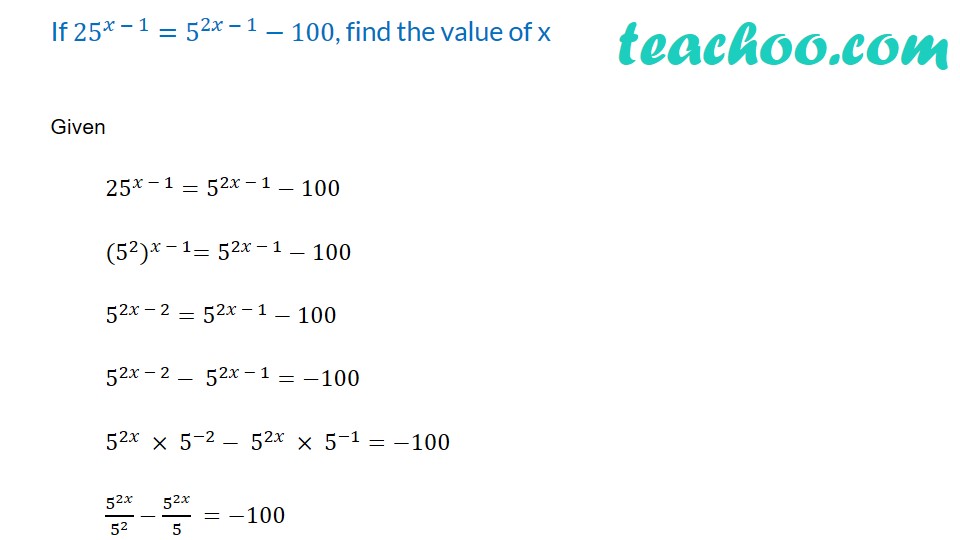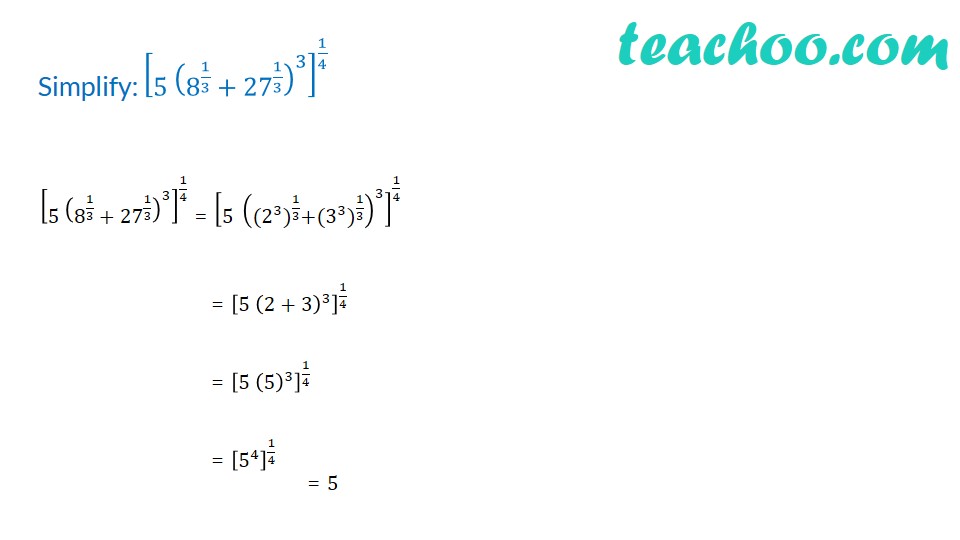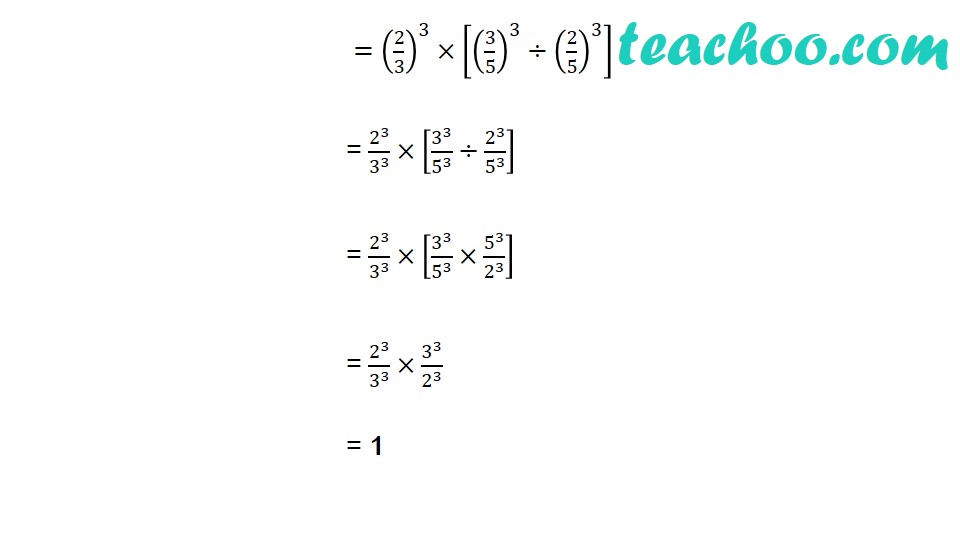Check the videos below, or you can...
Download the full summary














Laws of exponents
Last updated at Dec. 16, 2024 by Teachoo
Check the videos below, or you can...
Download the full summary














Transcript
Find (2/3)^2 ×(2/5)^(−3) × (3/5)^2 (2/3)^2 ×(2/5)^(−3) × (3/5)^2 = (2/3)^2 ×(5/2)^3 × (3/5)^2 = 2^2/3^2 × 5^3/2^3 × 3^2/5^2 = 𝟓/𝟐 Evaluate (i) ∛((343)^(−2) ) ∛((343)^(−2) ) = [(343)^(−2) ]^(1/3) = (343)^(−2 × 1/3) = (7^3 )^( (−2)/3) = 7^[3 × ((−2)/3)] = 7^(−2) = 1/7^2 = 1/49 (ii) √(5&(32)^(−3) ) √(5&(32)^(−3) ) = [(32)^(−3) ]^(1/5) = (32)^(−3 × 1/5) = (2^5 )^( (−3)/5) = 2^[5 × ((−3)/5)] = 2^(−3) = 1/2^3 = 1/8 Which of the following is not equal to [(5/6)^(1/5) ]^((−1)/6) (a) 1/[(5/6)^(1/5) ]^(1/6) (b) (6/5)^(1/30) (c) (5/6)^((−1)/30) (d) (5/6)^(1/5 − 1/6) Value of (256)0.16 × (256)0.09 is (A) 4 (B) 16 (C) 64 (D) 256.25 (256)0.16 × (256)0.09 = (256)0.16 + 0.09 = (256)0.25 = (256)^(1/4) = (2^8 )^(1/4) Which of the following is equal to x (a) 𝑥^(12/7)−𝑥^(5/7) (b) √(12&(𝑥^4 )^(1/3) ) (c) (√(𝑥^3 ))^(2/3) (d) 𝑥^(12/7) × 𝑥^(5/7) Find value of x, if 5x−3 × 32x−8 = 225 Given 5x − 3 × 32x − 8 = 225 5x − 3 × 32x − 8 = 25 × 9 5x − 3 × 32x − 8 = 52 × 32 Comparing powers of 5 and 3 If 〖25〗^(𝑥 − 1)=5^(2𝑥 − 1)−100, find the value of x Given 〖25〗^(𝑥 − 1)=5^(2𝑥 − 1)−100 〖(5^2)〗^(𝑥 − 1)=5^(2𝑥 − 1)−100 5^(2𝑥 − 2)=5^(2𝑥 − 1)−100 5^(2𝑥 − 2)− 5^(2𝑥 − 1)=−100 5^2𝑥 × 5^(−2)− 5^2𝑥 × 5^(−1)=−100 5^2𝑥/5^2 −5^2𝑥/5 =−100 5^2𝑥 (1/5^2 −1/5) =−100 5^2𝑥 ((1 − 5)/5^2 ) =−100 5^2𝑥 ((−4)/5^2 ) =−100 5^2𝑥 =100 ×5^2/4 5^2𝑥 =25 × 25 5^2𝑥 =5^2 × 5^2 Prove that (2^30 + 2^29+ 2^28)/(2^31 + 2^30 − 2^29 ) = 7/10 We have (2^30 + 2^29+ 2^28)/(2^31 + 2^30 − 2^29 ) = (2^28 (2^2 + 2 + 1))/(2^29 (2^2 + 2 − 1)) = (2^28 (4 + 2 + 1))/(2^29 (4 + 2 − 1)) = 2^((28 − 29))× 7/5 Simplify: [5 (8^(1/3)+〖27〗^(1/3) )^3 ]^(1/4) [5 (8^(1/3)+〖27〗^(1/3) )^3 ]^(1/4) = [5 (〖(2^3)〗^(1/3)+〖(3^3)〗^(1/3) )^3 ]^(1/4) = [5 (2+3)^3 ]^(1/4) = [5 (5)^3 ]^(1/4) = [5^4 ]^(1/4) Simplify (81/16)^(−3/4)×[(25/9)^((−3)/2)÷(5/2)^(−3) ] (81/16)^(−3/4)×[(25/9)^((−3)/2)÷(5/2)^(−3) ] = [(3/2)^4 ]^(−3/4)×[[(5/3)^2 ]^((−3)/2)÷(5/2)^(−3) ] = (3/2)^(−3)×[(5/3)^(−3)÷(5/2)^(−3) ] =(2/3)^3×[(3/5)^3÷(2/5)^3 ] = 2^3/3^3 ×[3^3/5^3 ÷2^3/5^3 ] = 2^3/3^3 ×[3^3/5^3 ×5^3/2^3 ] = 2^3/3^3 ×3^3/2^3 = 1